IN ENGLISH
TWILIGHT OF MONTENEGRIN INTERESTS IN AMERICA: Prayer Breakfast Instead of Real Diplomacy
Objavljeno prije
15 satina
Objavio:
Monitor online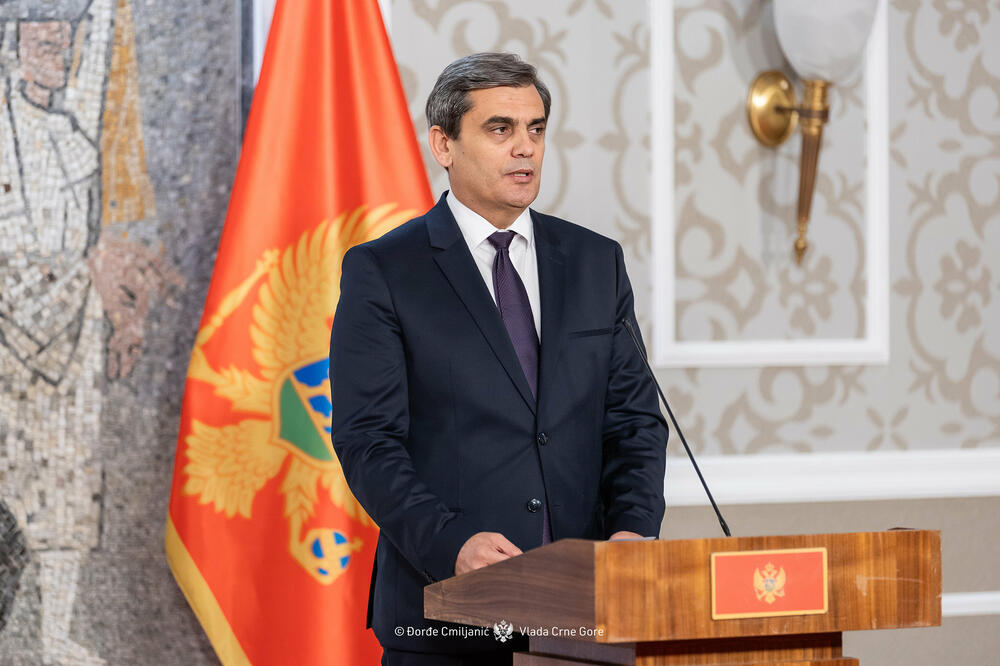
Aside from occasional trips and engagements with diaspora organizations, Montenegro shows little sign of having a coherent lobbying strategy in the United States. With the retirement of Congressman Doug Lamborn, the Montenegrin Congressional Caucus has dwindled to just one representative: Congresswoman Chellie Pingree from Maine
The 73rd annual National Prayer Breakfast in Washington recently took place, drawing more than three thousand leaders and prominent figures from politics and civil society from around the globe. Over the course of two days, participants had opportunities to network and exchange ideas at the Hilton Hotel, under the official patronage of the U.S. President.
Invitations were extended to a broad range of Montenegrin officials, including Prime Minister Milojko Spajic, Foreign Minister Ervin Ibrahimovic, Deputy Prime Minister for Economic Policy Nik Djeljoshaj, Minister of Urban Planning Slaven Radunovic, Minister of Transport Maja Vukicevic, and Minister for Human and Minority Rights Fatmir Djeka. Parliamentary invitees included many MPs, both from the opposition and the majority. Former President Milo Djukanovic and his close aide Branimir Gvozdenovic received invitations as well as several other ex officials. Also in attendance was Vijesti columnist and co-founder Zeljko Ivanovic—reportedly the only one whose travel wasn’t funded by taxpayers.
Branimir Gvozdenovic is often featured in pro-DPS (Democratic Party of Socialists) media as a regional liaison for the Prayer Breakfast. However, his name is absent from the official records of the event’s organizing foundation. Meanwhile, the Montenegrin delegation was accompanied by support staff including security, administrative personnel, and translators — necessary, since only Minister Vukicevic speaks fluent English. Translation was required for Djukanovic, Gvozdenovic and most MPs.
The cost of attending the Prayer Breakfast—including registration fees, three nights in a hotel, airfare, and daily allowances (currently €112 per day) — typically totals around $3,000 per person. When accompanying staff is added, the total bill reaches into the tens of thousands of euros. Out of the entire group, only Ministers Ibrahimović and Djeka were scheduled for official meetings at the U.S. State Department.
Minister for the Diaspora Adem Azemovic, representing the Bosniak Party, made his second trip to the U.S. in a month, accompanied by two associates. In late December, he met with Naser Nika, head of the Albanian-American Association of Staten Island. After the New Year he returned to meet him again. When asked why a second meeting was necessary, the Ministry explained that the first encounter had been brief, and the second was based on an official invitation. The association, which includes Albanian Montenegrins living in Staten Island, was praised for promoting Montenegro in New York.
Azemovic also visited the New York State Assembly, which is reportedly considering hosting Montenegro’s Independence Day celebration. His office described this as an opportunity to mark one of the country’s most significant holidays in a high-profile setting. Interestingly, Montenegro’s Independence Day was already celebrated at New York City Hall on May 23, 2024, in an event organized by the Albanian-American Association of Ulcinj. That celebration included Montenegro’s Consul Amer Cikotic and the Association’s president Dzelal Lanica. Nika had publicly criticized the event on Facebook, claiming that it misrepresented interethnic relations in Montenegro and highlighted Serbian political influence via Serbian President Vucic-backed factions.
Despite these diaspora engagements, there is little to suggest that Montenegro has any serious lobbying efforts in Washington—particularly with key decision-makers. Nebojsa Medojevic, leader of the Movement for Change (PZP), remarked that “Montenegro simply failed to grasp the magnitude and significance of political changes occurring in the U.S.”
“The current ambassador —Professor Jovan Mirković is openly anti-Trump and a personal ally of Aco and Milo Djukanovic” Medojević stated. “He has no meaningful contacts in Washington and no ideological alignment with the current direction of U.S. politics, so it’s unclear who or what he’s even representing.” He went on to question the competence and professionalism of the current government’s foreign policy team.
Interestingly, Nebojsa Todorovic, the former chargé d’affaires in Washington, had warned the Ministry of Foreign Affairs (MFA) and the government in late 2023 to prepare for a potential return of Donald Trump.
Since arriving in Washington in mid-September, Ambassador Mirkovic has maintained a notably low profile. His biography reveals he spent several years in Russia during the early 1990s—the same period when Milan Rocen was serving as minister-counselor at the Yugoslav embassy. Sources claim that Mirkovic has family ties in Russia and is known for his longstanding loyalty to the Djukanovic regime. Neither Djukanovic nor his Democratic Party of Socialists (DPS) have ever renounced their 2011 strategic cooperation agreement with Putin’s United Russia. In fact, the DPS publicly reaffirmed its pride in these ties in Parliament last year.
With the departure of Doug Lamborn—one of the Montenegrin Caucus’s co-chairs—the group now counts only a single member: Congresswoman Chellie Pingree. Meanwhile, Serbia has been actively growing its influence. Foreign Minister Marko Djuric, a former ambassador to Washington, has built up the Serbian Caucus to nearly 40 members. Djuric even boasted that Serbia, though not a NATO member, has stronger U.S. ties than Montenegro.
Some claim that Serbia pressured Podgorica through influential regional businessmen into sending a low-impact figure to Washington. The contrast with past Montenegrin diplomacy is stark: Under Ambassador Srdjan Darmanovic, the Montenegrin Caucus had grown to 42 members, surpassing even the Albanian caucus. Darmanovic worked closely with Congressman Mike Turner to gain U.S. support for NATO accession—despite Djukanovic’s regime then-notorious links to organized crime and Russian intelligence services.
Efforts to revive the caucus were briefly relaunched by Nebojsa Todorovic, who during his stint as chargé d’affaires in 2023 helped re-engage 10 U.S. lawmakers, including Turner and other influential committee chairs such as Michael McCaul and Robert Aderholt. For a brief period, Montenegro held a unique status in the Balkans, with three Congressional committee leaders in its caucus.
However, Todorovic has since been recalled, and with him, much of Montenegro’s presence in Washington has faded again into inertia.
This raises uncomfortable questions: Is Spajic’s government reverting to the old practice of conducting diplomacy through informal channels and business networks, as seen under Djukanovic and his top advisor Rocen? At the time, oligarchs like Oleg Deripaska and other Putin loyalists were reportedly enlisted to lobby for Montenegro in the West.
That line of approach came at a steep cost to the country—and its reputation.
Jovo MARTINOVIĆ
Komentari
IZDVOJENO
IN ENGLISH
Government Summons Ambassadors for Consultations and Instructions: A Foreign Policy Tightrope
Objavljeno prije
15 satina
12 Aprila, 2025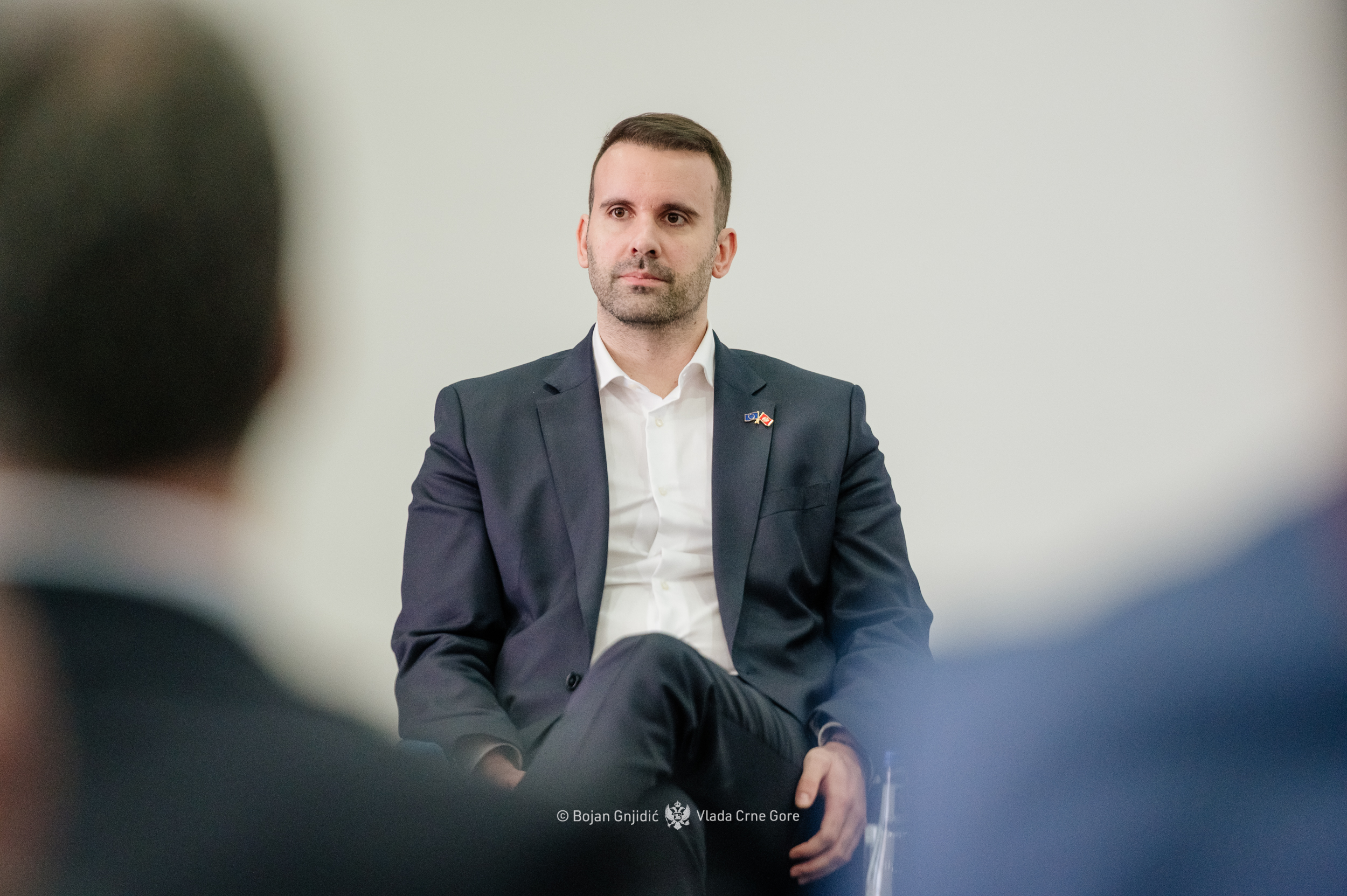
Prime Minister Milojko Spajic recently held a series of individual meetings with Montenegrin ambassadors—from Ukraine to Europe to the United States. Informal sources within the government say that during these meetings, the Prime Minister outlined a new geopolitical landscape shaped by Donald Trump’s return to power in the U.S. and evolving dynamics with the European Union
At the end of February, the Ministry of Foreign Affairs (MFA), led by Minister Ervin Ibrahimovic, summoned nearly all Montenegrin ambassadors stationed in Europe and the U.S. for urgent consultations, set to begin on March 6. The move sparked anxiety among some diplomats, who feared a repeat of the events of November 15, 2024, when three ambassadors were abruptly dismissed.
Monitor finds out that Spajić met separately with key diplomats, including Ukraine-based Borjanka Simicevic and U.S.-based Jovan Mirkovic. However, the concerns of mass dismissals proved unfounded. Instead, sources say the Prime Minister emphasized Montenegro’s continued commitment to the EU and instructed ambassadors to maintain a clear, pro-European stance. At the same time, he advised them against making any public criticisms of the United States or commenting on current rifts between the U.S. and its European allies.
Montenegro’s calibrated position became evident on March 11 at a meeting of top European military officials in Paris, where strategies for supporting Ukraine were discussed following Washington’s announcement of a suspension in military aid. The U.S. was not invited to the Parish meeting as the European leaders were keen to show they could step up independently if needed. Though an AP report initially stated that only Montenegro and Croatia, among NATO’s European members, failed to respond to the invitation, the Prime Minister’s Security and Defense Advisor, Todor Goranovic, told Radio Free Europe (RFE) that Montenegro would indeed participate. However, only the deputy military representative to NATO in Brussels attended because “Chief of General Staff Zoran Lazarevic was officially visiting Bulgaria at the time” – Goranovic explained.
Meanwhile, dissatisfaction is growing within Montenegro’s ruling coalition over Ambassador Mirkovic’s performance (or the lack thereof) in Washington. Tensions reportedly flared after a mid-February meeting with U.S. officials where he suggested that the fall of Serbian President Aleksandar Vucic could weaken some of his Montenegrin puppets. The details of the aforesaid meeting could not be independently confirmed. The subsequent report sent to Podgorica reportedly angered Spajic’s coalition partners from the former Democratic Front (DF). Although the DF was not directly mentioned in the report, its officials saw themselves as being referred to by the ambassador. One of them even retorted that those remarks would be a ground for the ambassador’s recall.
Discontent also emerged from the opposite ideological camp. Metropolitan Boris of the Montenegrin Orthodox Church (MOC) sent a protest letter to Minister Ibrahimovic, complaining that the embassy in Washington did not engage with the MOC delegation during their visit. The embassy, he wrote, failed to meet with them or assist in organizing meetings with U.S. officials. Furthermore, Metropolitan Boris complained that the embassy was “ignorant of some names and institutions that we wanted to reach out to”. He directly blamed the ambassador for the embassy’s dismissive stance.
As Monitor has previously reported, the embassy in Washington is increasingly out of sync with developments in the U.S. The once-prominent Montenegrin Caucus in Congress, which boasted 42 members under former ambassador Srdjan Darmanovic, has effectively dissolved. It’s now reduced to a single member—Congresswoman Chellie Pingree from Maine. Darmanovic had successfully lobbied to counter opposition to Montenegro’s NATO membership, despite concerns over ties of the Djukanović government with foreign criminal networks and Russian intelligence services.
Pingree reportedly sent multiple letters to the embassy criticizing the lack of engagement, but received no response. Monitor also reached out to her office twice for comment but had not received a reply at the time of publication.
Diplomatic affairs aren’t running smoothly in Europe either. In late January, the government approved the appointment of 14 new ambassadors. The list was coordinated with President Jakov Milatovic, whose signature is required for the appointments. Opposition parties and members of the pro-Serbian bloc raised objections, particularly over the inclusion of figures associated with the long-ruling Democratic Party of Socialists (DPS) and former foreign minister Milan Rocen.
One such appointee is Dragana Radulović, a longtime diplomat and former advisor to Prime Minister Dusko Markovic. She was posted to New York as Montenegro’s representative to the UN. She has been in diplomacy since 2000. Internal sources indicate that Veljko Milonjic initially hoped for the post in New York but was instead sent to Warsaw. Milonjic is remembered for his involvement in the so-called “cocaine affair” of 2015 when he was the head of Montenegro’s consulate in Munich. A truck from Munich carrying drugs under diplomatic seal was intercepted at the Austrian border. Though the Ministry of Foreign Affairs denied direct involvement, the incident cast a long shadow. Milonjic denied wrongdoing but was quietly recalled while the Consulate General in Munich was closed down. Milonjic was later appointed to a senior diplomatic post despite the scandal never being prosecuted. The truck driver, Sasha Mugosha, was sentenced to six years in prison. He was released after serving two and a half years and deported to Montenegro.
In March, the government announced that former German Bundestag member Holger Haibach had been appointed as a senior special advisor to Prime Minister Spajic, beginning January 1. Haibach will advise on regional relations in the Western Balkans and support EU accession efforts. His services will be funded by Germany’s Center for International Peace Operations (ZIF). While Haibach’s selection followed a public hiring process, sources in the diplomatic community question his current influence in Berlin. Haibach, a former CDU member of parliament, left office in 2011. Meanwhile, Veljko Kustrov, a Herzegovinian with close ties to Spajic, is considered his main point of contact in Germany.
Perhaps the most controversial diplomatic appointment so far is that of Dusanka Jeknic, a figure from the 1990s linked to the Djukanovic regime and repeatedly associated with cigarette smuggling. However, the Italian prosecutors could not present sufficient evidence against her in court. Jeknic was assigned to the embassy in Turkey after President Milatovic purchased property from her in Podgorica. Milatovic later claimed he had not been consulted on her appointment, stating that such decisions were under the MFA’s jurisdiction. He emphasized that his property purchase had been properly reported to Montenegro’s Agency for the Prevention of Corruption.
Previously, Milatovic had criticized the appointment of Predrag Drecun to lead Montenegro’s Investment Development Fund because of his close ties to the Djukanovic regime.
Montenegro is yet to drive a long and bumpy road before it gets a professional diplomatic network.
Jovo MARTINOVIĆ
Komentari
IN ENGLISH
2BS FORUM IN KGB HOTEL: Atlantic Council of Montenegro – who and what it represents?
Objavljeno prije
5 mjesecina
7 Novembra, 2024
The current ACM chairperson is Milica Pejanovic – Djurisic, a long-time official of the once ruling DPS, former minister of defence and a reputable senior diplomat. The activities of the ACM are realised through three centres of which the Digital Forensic Center (DFC) comes to the fore. DFC was founded in 2018 and has released a number of publications on Russian malign influence, mainly from the view point of DPS
Last week (3-4 Oct) the 14th To Be Secure Forum Montenegro (2BS) took place in Hotel Splendid in Becici – Budva, under the auspices of the Atlantic Council of Montenegro (ACM). Its website states that 2BS is a leading politico – security conference in Southeast Europe. This year’s topic is World in Disorder: Turning Adversity into Opportunity with a focus on the repercussions and security challenges in the Western Balkans.
The event brought together more than 400 participants including government officials, high-ranking representatives of international organisations and diplomatic missions, and prominent experts in security and international relations. ACM points out that “it has devoted itself to the promotion of Euro-Atlantic values and international security since it was founded in 2006”. In the same year, the ACM became a member of the global Atlantic Charter Association (ATA).
The current ACM chairperson is Milica Pejanovic – Djurisic, a long-time high official of the Democratic Party of Socialists (DPS). She was also a Minister of Defence and a reputable senior diplomat. The ACM activities are carried out through 3 centres, of which the most exposed is the Digital Forensic Center (DFC) founded in 2018. DFC has released a number of publications on the subject of Russian malign influence, mainly from the view point of DPS. Allegedly, the DFC was founded in order to “fight against disinformation, fake news and propaganda campaigns aimed at destabilising democratic processes in Montenegro and the Western Balkans.”
The founder of the 2BS Forum and the DFC is Savo Kentera from Budva. He chaired the Montenegrin Atlantic Council from 2008 until May 2022, when the minority government of PM Dritan Abazovic (supported by DPS in the national assembly) appointed him to head the National Security Agency (NSA). Mr Kentera lasted little less than 5 months. As soon as the 12th 2BS Forum in Becici was over, he was sacked by the government following the DPS termination of support to Abazovic after he signed signed the controversial Concordat with the Serbian Church (SOC). Prior to his sacking Mr Kentera launched an NSA operation against Russian spy network, allegedly in cooperation with international partners and the Special Prosecutor’s Office (SPO). Two Montenegrin citizens were arrested, 6 Russian diplomats were expelled, and 28 foreigners were barred from entering the country.
However, the whole operation turned out to be a farce. Eventually, the two Montenegrins were not accused for espionage. Only one was suspected for illegal possession of weapons. No trial has ever taken place.
It is worth noting that the 2BS Forum founder (who claims that he supports Euro-Atlantic values) for many years chose the same hotel for the conferences. The founder of Hotel Splendid and its majority owner is now late Viktor Ivanyenko – retired director of the infamous KGB. During his term under President Boris Yeltsin, the service changed its name to the Federal Security Service (FSB). How a state employee and the chief of spies of the Russian Federation (and with money of dubious origin) came to own 4 hotels on the Montenegrin coast was never a reason for any concern, let alone inquiry, while the country was led by so-called pro-western Milo Djukanovic.
The Russian president Vladimir Putin (who was also at the helm of FSB following Ivanyenko’s retirement) said in 2004 that “ there is no such thing as a former KGB man”. The hotel is known as a meeting place of Russian intelligence and foreign and local business people and/or criminals. One of them, very close to Djukanovic, was put on the US Treasury’s blacklist, while another of his buddies is now under the protection (from going to prison) of Aleksandar Vucic.
Not only politicians and criminals have links with the Russian intelligence. In the aforesaid hotel on 24 May 2022 the then head of the Montenegrin Church (MOC) Miras Dedeic (The Rt Rev. Mihailo) met with a GRU (Main Intelligence Directorate) colonel Leonid Malofeyev. After a 5-hour meeting the two were photographed together. Mr Malofeyev, whose photographs with the Rt Rev. Mihailo were published by Podgorica-based Antena M, appeared in the robes of the Metropolitan of Moscow and All of Russia of The True Orthodox Church of Russia under the monastic name of Seraphim.
The aforementioned religious organisation (which is one of the proxies of the Russian intelligence) has developed deep ties with the MOC, including financial ones, according to critics of Bishop Mihailo. On the other hand, the Serbian Church has never even tried to conceal its non-spiritual ties with the Moscow Patriarchate. Based on the briefly opened state archives after the collapse of the USSR, the current Russian Church (ROC) head Kirill Gundyayev, is also a KGB agent who was later awarded tax free business with alcohol and cigarettes.
Much has already been published and circulated about substantial financial and political support of Vladimir Putin and his oligarchs to the project of independent Montenegro. Published audio conversations (covertly recorded) of the then Serbia and Montenegro ambassador to Russia Milan Rocen (and a long time confidante of Milo Djukanovic) have shed a new light on the Russian role in Montenegro’s independence drive. The release of heretofore unpublished recordings were recently heralded by the pro-Russian outlet IN4S. However, the publication of contents which could be potentially harmful to the DPS was stopped – allegedly on orders from the Russian embassy.
Under the DPS and its leader Djukanovic, Montenegro became one of the hubs for Russian spies and Russian organised crime in Southeast Europe. The western press and official reports of the western governments constantly warned about the Russian influence in Djukanovic’s fiefdom. Moreover, in 2011, the DPS signed a strategic agreement with Putin’s United Russia which has never been revoked. The DPS was recently challenged in the Montenegrin parliament to revoke the agreement with the United Russia. However, a DPS MP indirectly ruled it out.
In March 2023, a Russian opposition paper Novaya Gazeta and Transparency International, published a detailed report on the continued influx to Montenegro of Russian dirty capital, spies and intelligence experts for cyber warfare in 2019.
The purchase of real estates, including a cultural heritage site protected by law, and the further entrenching of Russian intelligence could not happen without the blessing of the DPS authorities. Back in 2019, Montenegro was already in NATO and claimed that it was on bad terms with the Kremlin due to so-called coup d’etat attempt in the fall of 2016 in the wake of parliamentary elections. The subsequent televised trial turned into a satirical farce resulting in the first-instance acquittal of all the defendants.
Nevertheless, the subsequent reactions of the prime minister show that the conference was rather used to promote Djukanovic again. Furthermore there are allegations of behind-the-stage efforts to broker a coalition deal for power sharing in the capital city of Podgorica with the political forces of the current president, Jakov Milatovic.
Spajic didn’t turn up at the Forum. He tweeted on X that the conference went “contrary to expectations” and became “mainly a platform for the analysis of local Podgorica election results by prominent experts like Djukanovic and Milatovic. They silenced the foreign guests by bickering against their own country.” According to informal sources, the Government has not wired the money yet.
The quantity and quality of ACM’s cooperation with similar organisations is also questionable, at least when it comes to the promotion of the aforesaid Euro-Atlantic values. Those values should primarily mean support for democracy, the rule of law and fight against organised crime.
In communication with our paper, the director of the European Center of the Atlantic Council of the USA, Jorn Fleck, emphasises that the ACM and the American Atlantic Council are two completely different organisations. As for the activities of the US Atlantic Council in Montenegro, Fleck says that “one of the Europe Center’s nonresident fellows attended the Western Balkans Growth Summit in May in Kotor. The same fellow was invited by event organisers to attend the inauguration of President Milatovic”. Furthermore, “in 2019, the Atlantic Council took a delegation of Congressional Staffers to the region, including a stop in Montenegro”.
Komentari
IN ENGLISH
The case of Vitaliy Grechin’s group and girls allegedly rescued in Porto Montenegro: Fight against human trafficking or scapegoating for box-ticking
Objavljeno prije
9 mjesecina
6 Jula, 2024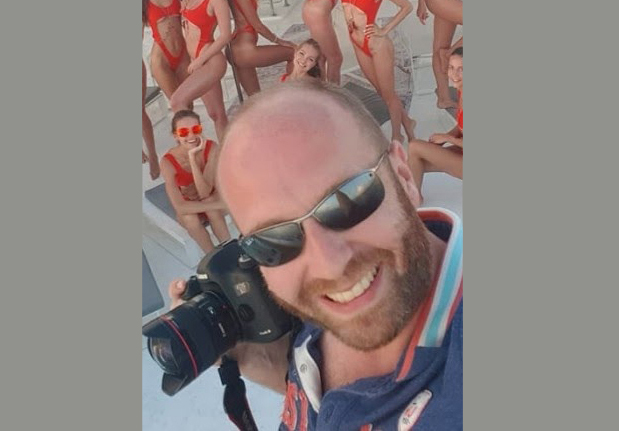
The Grechin case raises doubts that good statistics on fighting organised crime are more important than the fight itself. The prosecutor claims it’s a trafficking in women case whereas the allegedly trafficked women and the defence claim the opposite
Montenegro can hardly escape serious criticism in periodic reports on human rights violations and organised crime published by competent international organisations. However, the inadequate fight against human trafficking is the most serious objection. The State Department (SD) released the latest global report on human trafficking four days ago in Washington D.C. with highlights made by the US Secretary of State Anthony Blinken. When it comes to Montenegro in particular the report says “the Government does not fully meet the minimum standards for the elimination of human trafficking, but is making significant efforts to do so.” However, “the government demonstrated overall increasing efforts” compared to very bad 2023; thus Montenegro was upgraded to Tier 2 countries.
One of the “increasing efforts”, although not mentioned in the report, could be the case of a US citizen Vitaliy Grechin and his three friends, two Ukrainians – Oleksandar Lishchynsky and Oleksii Blahoslavov and one Russian – Bogdan Petrov. The case raises suspicion that another fixing of statistics with technical/cosmetic embellishments might be in place, which was a common practice during the previous regime. Although the governing power has been changed, the Montenegrin courts, the state prosecution (with exception of the Special Prosecutor’s Office) and the police have remained largely unreformed and staffed with the vetted appointees of the former Democratic Party of Socialists (DPS) regime.
The indictment says that in October 2023, Grechin, together with the other three, then “a certain Marko R from Belgrade” and “a photographer Aleksandar from Russia” recruited and transported the victims in an organised manner “for the purpose of sexual exploitation and use for pornographic purposes”. The aforesaid Grechin, Blahoslavov and Petrov bought plane tickets for the girls and waited for them at the airports in Tivat and Podgorica, then transported them to “exclusive hotels and accommodation – villas and Hotel Regent in Porto Montenegro”. It is further claimed that the defendants “organised in advance the unannounced photographing and recording of naked bodies with the aim of sexual exploitation and use for pornographic purposes on (Internet) platforms”. Moreover Petrov was subsequently charged with facilitating the use of narcotics (Article 301 of the Criminal Code) since he had prepared a so-called joint at the request of one of the girls and left it ready for use on her bedroom terrace. The Forensic Centre in Danilovgrad found that the cigarette contained 0.06 grams of cannabis, while further 0.2 grams of cannabis remains were found on the grinder.
The topic is a very delicate one and requires a careful examination before jumping to conclusions. According to the case files, which the Monitor had access to, not a single girl believes she has been “rescued” by Montenegrin police. Out of 15 girls who gave statements before the prosecutor, 10 girls had serious objections to the behaviour of police officers. In the statements (made in November 2023, January and February 2024) the “rescued” girls described the Montenegrin police treatment of them as “rude”, “terrible” and “cruel”. They complained that they were “refused a lawyer”, denied a copy of their statement. They object to the official interpreters’ bias and deliberate mistranslation. Several of them said they were kept without food and water for hours, while one described how “a police officer hit the wall above my head when I wanted to say something”. Another said that “at the hotel they examined our bodies by undressing us in front of men” thus making her “morally and physically humiliated”. The police “kept us for 12 hours without food or drink and gave us no explanation” for such a treatment. Another girl described how the police officers “took us to the hotel to pick our things and were pulling us by our shirts, I felt malice and injustice”. One girl complained that “the police wrote down what I did not say” and that she signed the statement under pressure.
The only girl out of 18 alleged victims who joined the criminal prosecution against Gretchin is MM from Israel. One of Grechin’s lawyers, Nebojsa Golubovic, requested the court at the pre-trial hearing to exclude her statement from the case files because she consented to press the charges against Grechin at the time when the prosecutor was alone with her, without presence of the defence lawyers – which is against the law. The court records show that MM was interrogated without any lawyer being present on November 1, 2023, from 10:39 PM to 11:00 PM. In a recent telephone interview with the Monitor MM said that she had signed the statement “under pressure from the prosecutor and the police” having already been held for 6 hours. They wouldn’t allow her to call her parents. She says that no one translated what she was signing and that she was told that she could contact her parents only after she signed the statement. MM says that she doesn’t consider herself “rescued” by Montenegro’s police whereas Grechin is her longtime friend. Several other girls confirmed the same, saying that they came to Montenegro freely and that they had documents and money with them all the time and that they could move around freely. Some of them came with their parents and children to Montenegro several times and showed photos from 2023 and preceding years as a proof.
So far the HPO has not reacted to the accusations. The Monitor was told that a legal representative of 13 girls would soon file criminal charges against the police, both for inhuman treatment and for confiscating money, valuables and electronic devices from the girls. The Monitor also reached out a couple of local organisations that are specialised in protection of vulnerable groups and women’s rights. Both organisations refused to comment on the case files and/or get officially involved so as to monitor the proceedings.
The prosecutor in charge does admit in the indictment that, except for one, “the other witness statements (14 out of 15) do not correspond with the material evidence”, which raises the question of identification of human trafficking victims. The HPO refers to the statement of the European Court of Human Rights that “the victims themselves are often not aware that they are victims”. In this case, the public prosecutor claims that “in the case of existing material evidence – i.e. photographs and recordings obtained through searches of electronic devices, the inconsistency of their statements must be interpreted as the fear of the consequences of the proceedings and as the fear of the defendants themselves”. The prosecutor further points out that “the witnesses who didn’t testify in favour of the defendants, and even the witness who has joined the criminal prosecution, together with the witnesses who testified in favour of the defendants, eventually submitted their authorisation for use of the aforementioned photographs and recordings”. That was done “through the defendants’ attorneys and not through their appointed (by the prosecutor) attorney”.
The defence lawyers reject the prosecutor’s reasoning as in that line of work the so-called release forms are almost always signed when the photos are accepted for publication. This can be verified on the websites of several big photography agencies which provide similar services.
The prosecutor also claims that the material found in electronic devices has “explicit” and “pornographic” content. The allegation is pretty questionable though as it makes no distinction between pornography and erotica. Among the “evidence” are photos published in renowned American erotic magazine Playboy (Russian-language edition), for which Grechin and internationally awarded photographer Oleksandar Lischynsky worked for many times. Lischynsky lives in the Netherlands and erotic art photography is his specialty. Besides Playboy, he had his photographs published in other similar magazines, and on websites. He also held exhibitions in Germany and other EU countries. Some of the presented Playboy editions of 2019 and 2020 have bylines of Lischynsky (as a photographer) and Grechin (as a spatial designer).
One of Grechen’s attorneys Mr Vuk Jaredic submitted to the court the analysis of Dr Nikola Markovic PhD, a court expert in the field of art history – fine and applied arts. Dr Markovic made the report at the request of Mr Jaredic. He states that “when it comes to the aforesaid material, it is clearly visible that the author (Lischynsky) carefully and responsibly avoided any display of pornography or any content that ultimately could be noticed and recognised for explicit display or sexual organs or other sexual acts”. He further states that “it is clear that the aforesaid photographic material was not created for the purpose of any sexual gratification, but rather it was the author’s endeavour for an aesthetic solution whereby he tries to express his creative approach”.
Another court expert (for copyrights) Professor Miodrag Jovanovic PhD drafted his analysis upon Mr Jaredic’s request. Based on the statements of the each girl and their subsequent signed authorisation, he says that it proceeds that “the photographs and recordings made on 30 October 2023 are the authorship and intellectual property of Oleksandar Lischynsky”. Furthermore ”he had the absolute right to distribute, sell, give away and publish the aforesaid photographs and recordings, and to transfer the rights to third parties” concludes Professor Jovanovic.
Copies of the Playboy magazine were handed by the defence attorneys to the then chairman of the High Court in Podgorica Mr Boris Savic at the pre-trial hearing (for control and review of the indictment) on 14 May this year. Public prosecutor Ana Kalezic did not turn up at the hearing. The defendants and their attorneys vehemently opposed the allegations in the indictment and asked the High Court chairman to reject the indictment as the deeds described therein do not constitute the criminal offence of human trafficking. The four have been in the pre-trial detention for eight months now.
Komentari
Kolumne

Novi broj
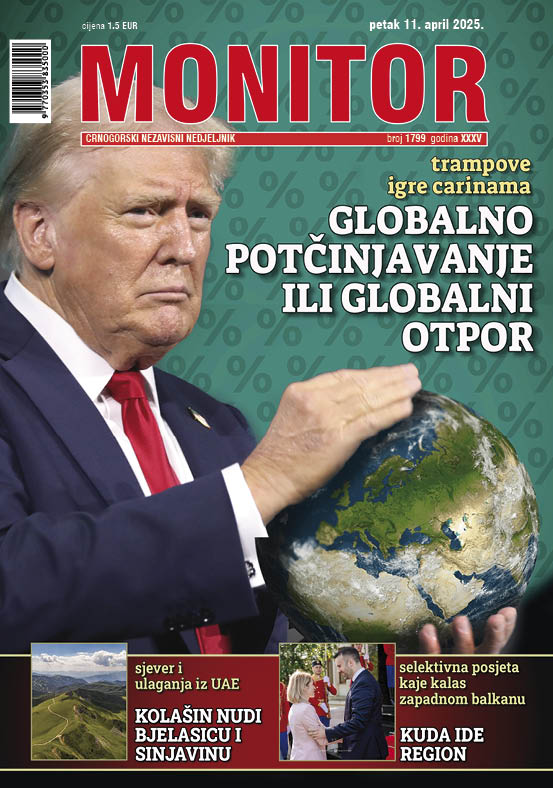

Government Summons Ambassadors for Consultations and Instructions: A Foreign Policy Tightrope

TWILIGHT OF MONTENEGRIN INTERESTS IN AMERICA: Prayer Breakfast Instead of Real Diplomacy

TRAMPOVE IGRE CARINAMA: Globalno potčinjavanje ili globalni otpor
Izdvajamo
-
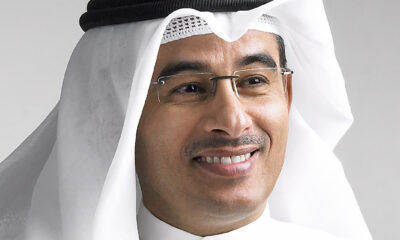
 DRUŠTVO3 sedmice
DRUŠTVO3 sedmiceŠEIK MOHAMED ALABAR – MEGA INVESTITOR NA VELIKOJ PLAŽI: Planove izradili planeri Beograda na vodi
-
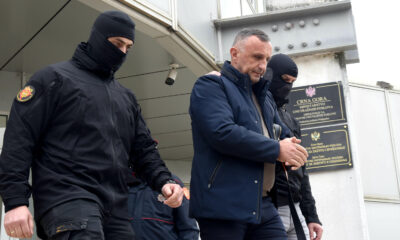
 DRUŠTVO2 sedmice
DRUŠTVO2 sedmiceNOVA HAPŠENJA ZBOG ŠVERCA CIGARETA: Pao i drugi vlasnik Tehnomaxa
-
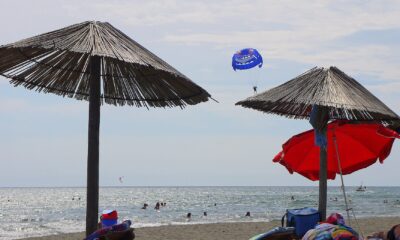
 DRUŠTVO3 sedmice
DRUŠTVO3 sedmice,,SLUČAJ TENDER” ZA ULCINJSKA KUPALIŠTA: Brzina koja budi sumnju
-
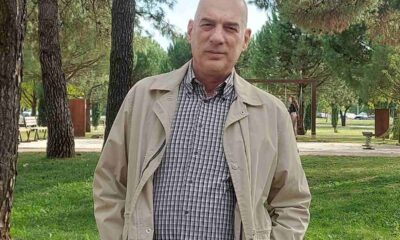
 INTERVJU3 sedmice
INTERVJU3 sedmiceBALŠA BRKOVIĆ, PISAC: Svi smo mi pod krovom neke nadstrešnice
-
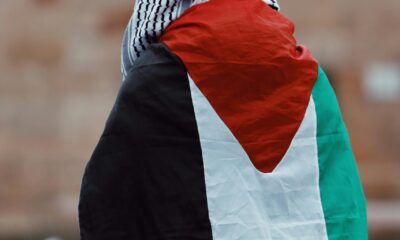
 Izdvojeno3 sedmice
Izdvojeno3 sedmiceGAZA U IZRAELSKO-AMERIČKOM PAKLU: Zeleno svijetlo za čišćenje
-

 Izdvojeno2 sedmice
Izdvojeno2 sedmiceVLADA ZVALA AMBASADORE NA RAPORT I INSTRUKCIJE: (Ne)sluh za vanjsku politiku
-
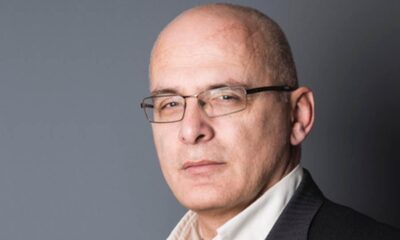
 INTERVJU3 sedmice
INTERVJU3 sedmiceNIKOLA LUNIĆ, IZVRŠNI DIREKTOR SAVJETA ZA STRATEŠKE POLITIKE IZ BEOGRADA: Upotrijebljen je neki od nesmrtonosnih sistema za suzbijanje demonstracija
-
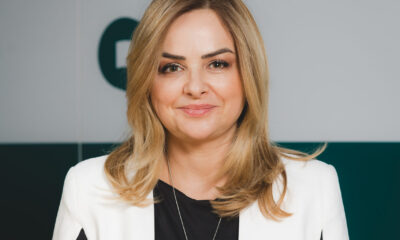
 INTERVJU2 sedmice
INTERVJU2 sedmiceDALIBORKA ULJAREVIĆ, CENTAR ZA GRAĐANSKO OBRAZOVANJE: Nerazminirano polje






